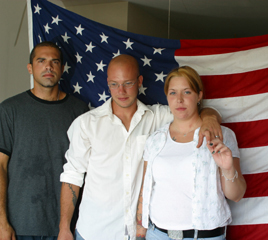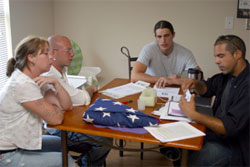 David Motwani, James Stevens, and Sara Stevens are working to form a local Bill of Rights Defense Committee. (Photo by Vishal Malhotra)
David Motwani, James Stevens, and Sara Stevens are working to form a local Bill of Rights Defense Committee. (Photo by Vishal Malhotra)
|
 The local group makes plans for its first public meeting, scheduled for June 25. (Photo by Vishal Malhotra)
The local group makes plans for its first public meeting, scheduled for June 25. (Photo by Vishal Malhotra)
|
|
A D V E R T I S E M E N T
|
|
|
|
A D V E R T I S E M E N T
|
|
Battling for the Bill
Young activists hope to add Fort Worth as a “safe zone” for constitutional freedoms.
By CHRISTINE STANLEY
For James and Sara Stevens and David Motwani, the quest to turn Fort Worth into a civil liberties safe zone is not about hating the president or the war in Iraq. The twentysomethings don’t really care about supporting conservatives or liberals — they just care about fighting the USA PATRIOT Act. To them the bottom line is that their freedoms are being threatened, and blind obedience — to the government or anyone else — is un-American.
So the Stevenses and Motwani are working to form a local Bill of Rights Defense Committee, a non-partisan group that will eventually try to convince the Fort Worth City Council to officially commit the city to the preservation of civil liberties. If they are successful, Fort Worth will become the newest member of a nationwide grassroots campaign centered on the USA PATRIOT Act.
Bill of Rights Defense Committees have now been formed in close to 400 cities across the country. Their members work to keep the PATRIOT Act at the forefront of public debate by calling on city officials to take a formal stand against any civil rights abuses that arise from enforcement of the act and other anti-terrorism laws, and declaring their areas to be “civil liberties safe zones.”
The committees include everyone from doctors to ministers — and in Fort Worth’s case, electricians and retail workers. And while many regard the cities’ resolutions as more symbolic than anything else, federal officials apparently are taking them seriously: When a “safe zone” resolution was under consideration in Dallas, a high-ranking Justice Department official came to Dallas to oppose it, as did a federal prosecutor and U.S. Rep. Pete Sessions — and one city council member wondered out loud whether the resolution, which eventually passed, could affect the city’s requests for federal funds.
Since its passage in 2001, the PATRIOT Act has been severely criticized by civil libertarians, who object to the unprecedented powers it gives federal investigators to gather information on citizens, from financial records to e-mail that’s surreptitiously intercepted to political organizations’ mailing lists.
The act’s detractors, including the American Civil Liberties Union, are also worried about the ability federal agents now have to secretly inspect library patron records — and to prevent librarians from telling patrons that their records were searched. They object to “sneak and peak” searches, which allow federal agents to search a home or business without prior notification, and “roving” wiretaps, which allow investigators to eavesdrop on any communication device that they suspect a terrorist could be using, including a public library computer.
“People need to realize that this does affect them on a personal level,” Motwani said. “Granted, [national] safety is a major issue, but it’s like Benjamin Franklin said, ‘Whoever would sacrifice their essential freedom for a little bit of safety deserves neither freedom or safety.’”
Motwani and the Stevenses are still in the initial stages of organizing the Fort Worth committee. The group has been passing out fliers for their first public meeting, scheduled for 3 p.m., June 25, at the arts collective 1919 Hemphill. The inconspicuous building at that address, sandwiched between houses and apartments, has been providing a home for upcoming bands, avant-garde artists, and grassroots groups since 2002.
James said the local Green Party has promised its support and that the Bill of Rights group is talking with local ACLU representatives. But the committee organizers still need more help. While they’re well versed in the PATRIOT Act and all its aspects, Motwani and the Stevenses are definitely not lawyers. James and Motwani are electricians, and Sara, when she’s not taking care of her three children, works at Old Navy.
In contrast, Chip Pitts, founder of the Greater Dallas Bill of Rights Defense Committee, is an attorney and former Southern Methodist University law professor who now lectures at Stanford. He also chairs the board that oversees Amnesty International’s work in the United States.
The Dallas City Council eventually adopted the resolution that Pitts’ committee sought, but not without plenty of opposition — including from Mayor Laura Miller. Just before the council vote, Charles Rosenberg, chief of staff for Deputy U.S. Attorney General James Comey, flew to Dallas to participate in a town hall-type debate about the resolution. Matthew D. Orwig, U.S. attorney for the Eastern District of Texas, testified against the resolution, as did Pete Sessions, who told the council’s public safety committee that he would be “disappointed” if Dallas leaders didn’t recognize Congress’ wisdom in passing the PATRIOT Act.
At the same meeting, Dallas city councilman Mitchell Rasansky said he thought it would be hypocritical for Dallas to pass a resolution against the PATRIOT Act if the city expected to receive any money from the federal government for homeland security measures.
“I will not support this,” he said. “I think this is wrong. We’re asking for federal dollars to build a bridge here. I want to see what happens — good luck.”
The Dallas council approved the resolution on a 9-6 vote. Miller said she opposed it because she didn’t think the city council was an appropriate forum for weighing in on federal issues.
The nation’s first Bill of Rights Defense Committee was founded in November 2001, with seasoned Massachusetts activist Nancy Talanian as one of its driving forces. The Northampton, Mass., city council adopted the first civil liberties safe zone resolution unanimously. Now seven states have signed on, and there are committees forming or operating in every state except Alabama and North Dakota. The National League of Cities passed a resolution in 2003 stating that efforts to combat terrorism “should not disproportionately infringe on the essential civil rights and liberties of the people of the United States.” Even New York City, Ground Zero, passed a resolution in February 2004, calling on federal, state, and local officials to uphold civil liberties.
Cities and other entities have approved several different kinds of civil liberties resolutions. Some call for largely symbolic measures, like a city formally supporting its residents’ rights to civil liberties, or a commitment to avoid discrimination in all functions of city government. Others call for specific actions, such as posting signs at public libraries warning that federal agents can obtain patrons’ check-out records, or calling on city council members to petition Congress about reining in some provisions of the act.
Federal officials maintain that the PATRIOT Act has not led to any civil liberties abuses. Justice Department officials acknowledge that some provisions of the act are controversial, but say that the criticism is misguided. Sixteen provisions of the act are scheduled to phase out in December of this year, unless extended by Congress.
Talanian said that, despite Washington’s opposition to the work of the civil rights committees, she has never heard of federal funds being withheld from any city that approved a “safe zone.”
In Fort Worth, activists haven’t yet approached the city council officially, so they’re not sure how tough the fight will be here. Newly elected councilman Salvador Espino said he believes the PATRIOT Act went too far, and he sympathizes with the Bill of Rights activists. But he’s skeptical about the power of a local resolution to affect anything on a federal level.
“You see what we deal with here — buildings, roads. ... I think all we can do is pass a resolution. I don’t know if it’s going to make a difference with our national leaders,” he said.
Sara Stevens said she’s part of the effort because she’s worried about the nation’s future — and her kids’ future.
“I think future generations can benefit from this, too,” she said. “We have three kids, and there are so many bad things that can happen with this [law]. When we’re not here, we can’t protect them anymore.”
 Email this Article...
Email this Article...

